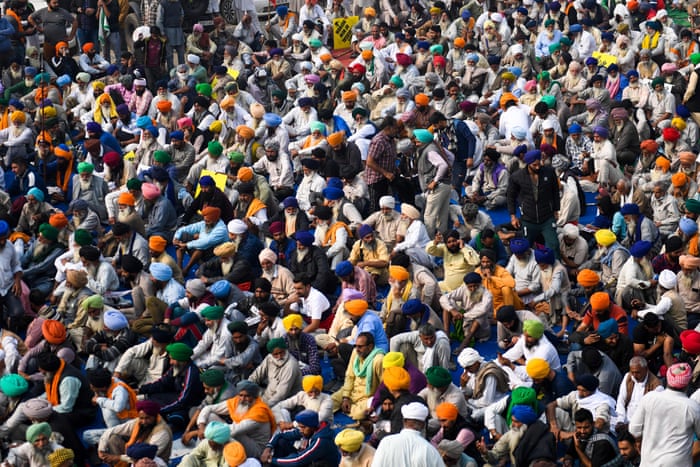So many conspiracy theories have been doing the rounds in the national capital, following the large scale violence culminating in the hoisting of the Nishan Saheb on the ramparts of Red Fort. The incidents completely overshadowed the traditional Republic Day celebrations, and uninterrupted coverage by the electronic media apparently shifted the focus from both the demands of the agitating farmers, as also the sanctity of this national occasion.
Multiple issues regarding police unpreparedness, failure of intelligence agencies as well as the role of agent provocateurs and mischievous elements came into focus. However, the saving grace was that despite so much of mayhem, the casualties were restricted; a young farmer was killed when his tractor overturned after hitting the barricades.
The aftermath of the avoidable happenings on 26 January has disillusioned some of the staunchest supporters of the farmers and has caused an unbridgeable rift amongst various factions, some of whom, from the very beginning, had been obliquely following the government’s line. The silver lining was that majority of farmers conducted themselves peacefully and thus continue to believe that the only way forward was for the government to see reason, and repeal the laws. This does not seem to be happening.
What is a bit surprising is that neither the Home Minister, nor the National Security Advisor or for that matter, the Prime Minister has made any statement concerning the high voltage tension that was generated on that day. The Delhi Police, which is one of the finest forces in the country, was made to look like a bunch of sissies as they were both outnumbered and overawed by the militancy exhibited by a section of protestors, who claimed to be farmers. The police probe has commenced and obviously the perpetrators would be brought to book.
However, the ease with which a violent mob barged inside the Red Fort, despite the fact that the parade ends at the venue and is overseen by the Indian Army, does raise doubts about the role of the security establishment. Even on normal days, it is not easy to get inside the Red Fort, that has over the years, been associated with both the Independence Day and the Republic Day celebrations. There are so many checks one has to go through in order to enter the premises. However, on the day when the security alert is at its highest level, there was a complete breach, as many protestors, including those on horseback had a field day.
Several top police officials, former and present, were unconvinced that such a security gaffe would have happened, unless there was some sort deliberate laxity at some level or the other. In this context, there has also been discussion in police circles, whether this was an intelligence driven exercise aimed at containing violence, identifying and arresting Khalistan extremists, who could have infiltrated the ranks of farmers, and above all diluting the demand to repeal the laws.
While it is for the government to counter the charge, there have been activities in the past when a well thought through plan has been devised and accomplished to deal with difficult situations. I can vividly recall that in May 1988, S.S. Virk, then a CRPF DIG, was injured by militants holed up in the Golden Temple complex.
The attack on the police officer was used by the government agencies to launch one of its most successful operations to flush out armed militants, who had taken refuge in the holy shrine. Unlike “Operation Blue Star” in June 1984, when the Indian Army used excessive force to eliminate amongst others, Jarnail Singh Bhindranwale, General Shahbeg Singh and Bhai Amrik Singh, “Operation Black Thunder-II” was the most meticulously planned and executed exercise of the Indian State.
Having covered for the Hindu, the entire ten-day operation, whose blueprint till the last detail was finalized by Ajit Doval, then one of the finest field operators of the Intelligence Bureau, I have till this date memories of the systematic manner in which the militants were dealt with. Incidentally, this was also the first major task undertaken by the Punjab Police under K.P.S. Gill, with the National Security Guard, under the overall leadership of Ved Marwah, providing cover with its sharp-shooters.
In fact, Operation Black Thunder was the collective success, achieved under three of India’s police legends—Marwah, Gill and Doval and in the annals of the security archives, shall be remembered for its deftness. The Indian intelligence had totally infiltrated the ranks of those who were holed up in the compound. Malkiat Singh Ajnala, Nirvair Singh and Doval were inside the precincts.
Many of us witnessed from the top of the Guru Ram Dass Sarai extremists such as Karaj Singh Thande being gunned down by the NSG and after the surrender on 20 May, watched with horror how Surjit Singh Penta, a former Delhi athlete, who had killed BJP leaders Hansraj Sethi and Sudershan Munjal, committed suicide by consuming cyanide. Penta belonged to Jandiala, the same village as that of Harjinder Singh Jinda, the assassin of General A.S. Vaidya and Congress leaders, Lalit Maken and his wife, Geetanjali.
In the latest instance, the insinuation is that Deep Sidhu and some others were embedded amongst the farmers to provide a Khalistan twist to the protests. This is a speculation that would have to be ascertained by the probing agency. Meanwhile, a path has to be found to end the impasse. Between us.
Questions remain regarding farmers’ protests
- Advertisement -

